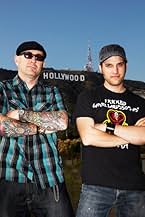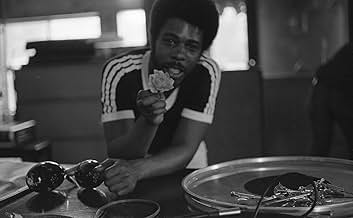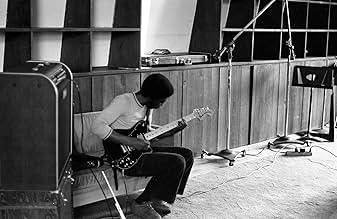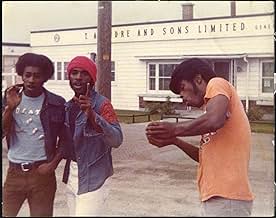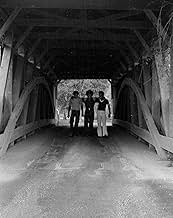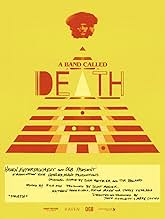ÉVALUATION IMDb
7,5/10
4,1 k
MA NOTE
Ajouter une intrigue dans votre langueA documentary on the 1970s punk trio Death, and their new-found popularity decades after they disbanded.A documentary on the 1970s punk trio Death, and their new-found popularity decades after they disbanded.A documentary on the 1970s punk trio Death, and their new-found popularity decades after they disbanded.
- Prix
- 7 victoires et 3 nominations au total
Bobby Hackney
- Self - bass and vocals, Death
- (as Bobby Hackney Sr.)
David Hackney
- Self - guitar, Death
- (archive footage)
Earl V. Hackney Jr.
- Self - not a member of Death
- (as Earl Hackney Jr.)
The Beatles
- Themselves
- (archive footage)
The Who
- Themselves
- (archive footage)
Lambsbread
- Themselves
- (archive footage)
Avis en vedette
David, Bobby and Dannis Hackney are not legends in the world of punk rock, and it's a shame they are not a part of the punk rock lexicon. While they are not necessarily the progenitors of punk rock, they were raucous and loud enough to predate other well known bands like The Ramones, Iggy and the Stooges, Sex Pistols, The Damned and many, many others. It's unclear how influential they would have been, but it is clear they had a boat load of talent.
While one might think the story of a lost band would be the theme of the film, it actually turns out to be a story about family. The Hackney brothers stood together though a lot of problems, whether it was due to the strange dislike to their name, the racial politics of being a African American rock band in Detroit, the eventual pushback they got for morphing into a Christian rock band or just the division between the virtuoso guitarist David and his two more pragmatic brothers Bobby and Dannis. The family is front and center in the whole documentary, because it was ultimately a younger generation of Hackney's that helped the world discover their music.
You see, the three sons of Bobby Hackney helped bring the music to the masses, and now the band has a much bigger following than it ever had. It continues the element of how important family was to the band's dynamic, even after the loss of David Hackney in 2000.
The documentary wasn't able to follow the brothers post life after 2012, but they recorded another album and continue to bask in the positive fall out of the band's reemergence. Needless to say, this is a nice documentary about music, family and life.
While one might think the story of a lost band would be the theme of the film, it actually turns out to be a story about family. The Hackney brothers stood together though a lot of problems, whether it was due to the strange dislike to their name, the racial politics of being a African American rock band in Detroit, the eventual pushback they got for morphing into a Christian rock band or just the division between the virtuoso guitarist David and his two more pragmatic brothers Bobby and Dannis. The family is front and center in the whole documentary, because it was ultimately a younger generation of Hackney's that helped the world discover their music.
You see, the three sons of Bobby Hackney helped bring the music to the masses, and now the band has a much bigger following than it ever had. It continues the element of how important family was to the band's dynamic, even after the loss of David Hackney in 2000.
The documentary wasn't able to follow the brothers post life after 2012, but they recorded another album and continue to bask in the positive fall out of the band's reemergence. Needless to say, this is a nice documentary about music, family and life.
A bittersweet tale involving the intensity of rock and roll of the wildest, most bracing sort, the vindication of art and the uncompromised vision of a dreamer, an artist like so many, who had to die before the world caught on to his genius.
A heartwarming tale of the strong bonds of family and the unknown surprises lurking in almost all of our pasts.
A film where the heroic role of the rescuers and redeemers is taken up by record collector nerds and glasses-wearing hipsters (YAY!)
A story that, like all the greatest documentaries, is true, but feels so much like a feel-good Hollywood fairy tale that you can't believe it all really happened. But it did.
This is really corny, but hey, when a film is this good, why not indulge in the oldest possible style of film hype: You'll Laugh! You'll Cry! You'll Cheer! Go See A Band Called Death! The Most Feelgood film of the year with the word death in the title!
If you like this, check out "Anvil! The Story of Anvil." Just as tearjerking and entertaining.
A heartwarming tale of the strong bonds of family and the unknown surprises lurking in almost all of our pasts.
A film where the heroic role of the rescuers and redeemers is taken up by record collector nerds and glasses-wearing hipsters (YAY!)
A story that, like all the greatest documentaries, is true, but feels so much like a feel-good Hollywood fairy tale that you can't believe it all really happened. But it did.
This is really corny, but hey, when a film is this good, why not indulge in the oldest possible style of film hype: You'll Laugh! You'll Cry! You'll Cheer! Go See A Band Called Death! The Most Feelgood film of the year with the word death in the title!
If you like this, check out "Anvil! The Story of Anvil." Just as tearjerking and entertaining.
In recent years there seems to have been a cycle of music documentaries about musicians of whom success has eluded. In Anvil: the Story of Anvil we have a band who have had extremely limited success over a very long period, in Searching for Sugarman we have an artist who had extremely minor success and then disappeared only to be rediscovered a quarter of a century later to great acclaim and in 20 Feet from Stardom we have the story of singers whose work we hear everywhere but of whom remain unfairly obscure. A Band Called Death contains elements of all of these documentaries, except in this one the band didn't even release an album until 35 years after their initial demo.
Death were a Detroit proto-punk band. Not only that but they were an all-black proto-punk band, which makes them very unique. There were very few black musicians operating in this area of music back in the 70's. Its details like this that makes their story all the more unusual. Having heard their music, I have to say it was pretty good. Forget proto-punk, this stuff sounded more like post-punk. Its combination of aggression with tight highly skilled musicianship was certainly ahead of its time and sounds more like the more expansive alternative rock that followed in the wake of the punk years. I suppose, looking back on it, being so ahead of their time was one of the problems the band had in getting a record deal. Likewise, their name was a major handicap. Band leader David Hackney conceived of the name and insisted on it being retained at all costs. This of course led to the group losing the one record contract they were offered. It is testament to David's principles but it does seem like a self-defeating stance, as it's the music that counts most, the name is so much less important and we are left wondering what could have been. Of course, a name like 'Death' and music such as theirs is entirely in-step with today's contemporary alternative rock, which is why they were rediscovered to such fanfare. It's great to see them finally have their time in the sun.
The two surviving brothers are genuinely good blokes and we learn most of the story of the band from them. Their brother David died some time round about the year 2000 of lung cancer, so there is a bittersweet nature to the band's late acceptance and success. David was the main visionary of the band. He was a dreamer. It is sad that he never saw the band achieve its long-overdue success but until his dying day he always was convinced that one day people would come looking for their music. And he was proved correct. The film perhaps falls a bit short in detailing the Detroit rock scene of the time. It almost paints a picture where Death were the lone purveyors of this kind of confrontational rock music. This makes them seem more unique but it would have been good if the documentary at least acknowledged fellow Detroit pioneers such as The Stooges and The MC5. It would have put the band and Detroit itself into a bit more historical context. Also, it would have been interesting to know if they had a local following at the time and played any gigs. But, despite these minor issues, the film is still very successful because these guys were genuinely good and it's not a rose tinted spectacle affair. The film also functions as a mechanism for their music to reach an even wider audience and this in itself is a good enough reason for its existence. But the main thing is that now Death have been added to the rock family tree as an important precursor to punk and alternative rock. Even if, in the final analysis, none of that changes the fact that 'Death' is still a terrible name for a band
Death were a Detroit proto-punk band. Not only that but they were an all-black proto-punk band, which makes them very unique. There were very few black musicians operating in this area of music back in the 70's. Its details like this that makes their story all the more unusual. Having heard their music, I have to say it was pretty good. Forget proto-punk, this stuff sounded more like post-punk. Its combination of aggression with tight highly skilled musicianship was certainly ahead of its time and sounds more like the more expansive alternative rock that followed in the wake of the punk years. I suppose, looking back on it, being so ahead of their time was one of the problems the band had in getting a record deal. Likewise, their name was a major handicap. Band leader David Hackney conceived of the name and insisted on it being retained at all costs. This of course led to the group losing the one record contract they were offered. It is testament to David's principles but it does seem like a self-defeating stance, as it's the music that counts most, the name is so much less important and we are left wondering what could have been. Of course, a name like 'Death' and music such as theirs is entirely in-step with today's contemporary alternative rock, which is why they were rediscovered to such fanfare. It's great to see them finally have their time in the sun.
The two surviving brothers are genuinely good blokes and we learn most of the story of the band from them. Their brother David died some time round about the year 2000 of lung cancer, so there is a bittersweet nature to the band's late acceptance and success. David was the main visionary of the band. He was a dreamer. It is sad that he never saw the band achieve its long-overdue success but until his dying day he always was convinced that one day people would come looking for their music. And he was proved correct. The film perhaps falls a bit short in detailing the Detroit rock scene of the time. It almost paints a picture where Death were the lone purveyors of this kind of confrontational rock music. This makes them seem more unique but it would have been good if the documentary at least acknowledged fellow Detroit pioneers such as The Stooges and The MC5. It would have put the band and Detroit itself into a bit more historical context. Also, it would have been interesting to know if they had a local following at the time and played any gigs. But, despite these minor issues, the film is still very successful because these guys were genuinely good and it's not a rose tinted spectacle affair. The film also functions as a mechanism for their music to reach an even wider audience and this in itself is a good enough reason for its existence. But the main thing is that now Death have been added to the rock family tree as an important precursor to punk and alternative rock. Even if, in the final analysis, none of that changes the fact that 'Death' is still a terrible name for a band
"What good will it do to gain the world and lose your soul?" (Mark 8:36)
At some point in our lives, most of us surrender our dreams to responsibilities of life. Family, mortgages, and the careers to sustain them. All these things of life. Some necessary. Some necessary evils. And all those unfulfilled dreams follow us to our graves. Let's face it, for most of us, it takes balls to follow your dreams, because it takes balls to fail big.
"Death", and its lead-man David Hackney, had the balls to follow their dreams. Bound by faith, family, and an unshakable confidence, they followed their dream despite the odds stacked against them. They weren't afraid to fail big. They knew that their music and their vision for the band had risks.
Listening to their music, it's evident that they were way ahead of their time, and yes, unfortunately, not what the mainstream audience expected. But still, they persisted past the rejections, disappointments and heartaches, buoyed by family loyalty and love of music.
The bright light shining through the disappointment and heartache, is the love of family. The the real core and power of this movie, is how your family's love and faith doesn't fail, even when everything else has.
Here's to the dreamers. Your dreams will be realized long after your departure. Your dreams will be your legacy and your loved ones the beneficiaries.
Rock on, all you misfits.
At some point in our lives, most of us surrender our dreams to responsibilities of life. Family, mortgages, and the careers to sustain them. All these things of life. Some necessary. Some necessary evils. And all those unfulfilled dreams follow us to our graves. Let's face it, for most of us, it takes balls to follow your dreams, because it takes balls to fail big.
"Death", and its lead-man David Hackney, had the balls to follow their dreams. Bound by faith, family, and an unshakable confidence, they followed their dream despite the odds stacked against them. They weren't afraid to fail big. They knew that their music and their vision for the band had risks.
Listening to their music, it's evident that they were way ahead of their time, and yes, unfortunately, not what the mainstream audience expected. But still, they persisted past the rejections, disappointments and heartaches, buoyed by family loyalty and love of music.
The bright light shining through the disappointment and heartache, is the love of family. The the real core and power of this movie, is how your family's love and faith doesn't fail, even when everything else has.
Here's to the dreamers. Your dreams will be realized long after your departure. Your dreams will be your legacy and your loved ones the beneficiaries.
Rock on, all you misfits.
If, by the title, you suppose this is a documentary about sour grapes, i.e., some pre-Ramones, The Clash, or even The Sex Pistols punk band that never got its props, you're mistaken. There's not an iota of bitterness among these guys who stubbornly defied all odds, most of which were housed in their home town Motor City. I mean, what could have possessed three black teenage brothers to think they could form a prototype punk rock band just blocks away from Berry Gordy's mellow soul factory known as Hitsville USA? Having nothing more than British rock band singles, insurance-money instruments, and cloud formations to guide them, DEATH did it. (Note to my friendly reviewers: they weren't just the prototypical "black" punk rock group, but the forerunning "punk rock group" of any color...period.) But being so original, so very far ahead of the curve, came at a cost. Now therein lies the supremely inspirational message of "A Band Called Death" that anyone can leap into like a mosh pit. It took thirty-five years--35 friggin' years!--before surviving brothers Bobby and Dannis got their recognition. Sadly, David, the group's visionary, passed away years earlier, emotionally drained and physically terminal. Although only old tapes of David are featured in the film, his haunting presence throughout the film is undeniable. By the time you hear David's son share his emotions about hearing his deceased father's voice on a cult-hit record, you'll choke back tears. Even if you're not a punker, a funker, or a rocker, you owe it to yourself to check out this inspiring documentary. Dreams deferred don't always shrivel, sometimes they hibernate. So if you miss DEATH's story this time around, the group will wait, patiently, for as long as it takes. They're accustomed sleepers. But mark AfroPixFlix's words (and his nine forks of good judgment), you'll not long be able to escape DEATH's grip.
Le saviez-vous
- AnecdotesA list of all the bands the Hackney brothers have formed, in consecutive order: Rockford Funk Express (Funk) Death (Punk) The 4th Movement (Gospel) Lambsbread (Reggae) [without David] Death (Punk) ) [without David]
- ConnexionsReferenced in Film Junk Podcast: Episode 423: World War Z and Monsters University (2013)
- Bandes originalesWhere Do We Go From Here?
Performed by Death
Written by Bobby Hackney (as B. Hackney)
Courtesy of Elect Music Publishing
Meilleurs choix
Connectez-vous pour évaluer et surveiller les recommandations personnalisées
- How long is A Band Called Death?Propulsé par Alexa
Détails
Box-office
- Brut – États-Unis et Canada
- 127 257 $ US
- Fin de semaine d'ouverture – États-Unis et Canada
- 34 839 $ US
- 30 juin 2013
- Brut – à l'échelle mondiale
- 127 257 $ US
- Durée1 heure 36 minutes
- Couleur
- Rapport de forme
- 1.78 : 1
Contribuer à cette page
Suggérer une modification ou ajouter du contenu manquant







